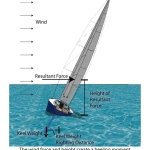How to be a good leader on a sailboat
Leadership and Friendship on a Sailboat Adventure
This is a pretty embarrassing story for me to tell but I’m going to tell it anyway in first person rather than say “I knew a guy who once who …”. It’s pretty much a result of me getting out of the wrong side of the bed and it affected my abilities on a boat and turned a really good day out into a massive reset relearning experience for me – and a dang good blog topic. One that I really hope you devour and take to heart.
It’s about how to be an effective leader on a boat.
Being on a boat is a test of your personal management and people skills. Typically you have friends, family, spouses etc on the boat and also often, friends of friends. So as a skipper, managing all those people and personalities is a challenge not to be taken lightly. The test of success is to end the adventure where people still like you because that’s more important than anything. Much of the time leadership is not a big issue, especially on a day outing but sometimes and especially on a week-long adventure, situations arise when you can make the biggest of mistakes with people.
He’s an example of a situation this past weekend. We all went out on my friend’s Beneteau 37. It was an awesome day with lots of wind and I was anxious to fly his gennaker.
On the boat were my friend (the owner) some of his friends and some of mine. Amongst the friends were various levels of sailing experience from zero to intermediate.
My friend and I have captained boats all over the world, so stepping on the boat we made the giantest of mistakes by not setting roles and I made the biggest one of all by assuming the role of leader and completely forgetting that it was his boat
First off – a pleasure boat is not the corporate world and it’s not the military. People are on the boat solely to have a good time. They are away from the office and don’t want to be told what to do. They get enough of that in their jobs. So barking orders and using the excuse – I’m the Captain is not going to let people leave liking you.
And you’ve got to manage your own ego too. In my younger days before I realized this stuff here – I’d like to show off a little that I knew what was going on. It felt to me to raise myself worth and it felt good – to me. Note there is a lot of “me” in that. That information coming in from other people on the boat was already what I knew and I let them know that. Someone would say “watch out for that boat” and I would say “I know I already saw it”. Funny though because I’d take info from a GPS device but not from people. I also made the big leadership mistake in those days that knowledge was power and that I would gain leadership by showing knowledge which auto gave me the power. You can observe this this failing everyday in the corporate world. A boss will withhold info just to make them feel powerful and all it really achieves is that it pisses off their subordinates. So we know that doesn’t work.
What works well on a boat is the President Lincoln leadership style. Lincoln is attributed as being one of the world’s greatest leaders. He involved people to make them feel like they were part of the process. He gathered the advice and then made a decision. His Generals and others around him saw that he was taking input and thus they felt valued. When someone feels that they are valued – they will follow. They also see that you’re making a decision from the best advice at hand. Leadership is NOT about knowledge, it’s not about barking commands, leadership is about getting people to follow you from a perspective of respect in you. Respect is earned not appointed. You’ve got to be a respect ROCK and you can’t let your ego get in or your impatience take its toll or your anxiousness overtake.
This past weekend I lost my rockness for some reason. Up on wrong side of the bed? Don’t know!. The first thing that set me off was a crew member who I consider knowledgeable let go of the docklines when we were side-to in the wind. It blew us against the leeward dock and set us up for a scrape down the side of the boat. I lambasted him for this – in front of the other crew. Now who’s the jerk? He made a fundamental boating mistake but I made a bigger fundamental people mistake. What would have been better was to say something like – “Hey John – I think I’ll pass the dock line back over you so we can start again – the wind is pushing us against the dock and I don’t want to scrape the boat. We’ll recenter the boat and then you can walk back with it as we pull out holding us away from the dock. Is that ok?” But instead what came out was “Come on John you know better than that- what the hell did you release that line for?” Which comment would garner me respect from him and the other crew?
Next thing that set me off was after we had reefed the mainsail and were heading on a beam reach, the mainsail was sheeted in too tight and so I said let out the mainsail. Two crew members blew out the reef. OMG. So I went into lambast mode again. Now I’m looking like a real jerk again. After the lambasting, they claimed that my instructions were not clear. In my mind and my language, I’m going “wow if we’re on a beam reach and the sail is sheeted in tight – isn’t it bloody obvious that let out the main sail means let out the sheet, not the reef. OMG.”
So what’s happening here? Sounds like a corporate project meeting gone wrong with a leader promoted above their abilities, doesn’t it. Blame, yelling, stamping excuses.
I’m keeping this in first person, accepting personal responsibility for this and blogging this publicly because I want to make the point that even though I think I’m a good leader on a boat look who I turned into – this is not me – I’m always being told that I am the calmest captain ever – because I know this stuff – but what the @#$%. What happened was I let myself down and my internal known leadership skills.
What should I have done in that last instance? Well first off – there is no danger – you’ve got to accept that – next confront the fact that you are frustrated – next use this knowledge here to know that frustration is not going to solve the issue.
In Steven Covey’s book Seven Habits of Highly Effective People, he discusses this topic. He presents that Humans have the ability to observe an action, think about it and then after they have thought about it then they can decide on a reaction – that highly effective people are conscious of this and engage this in their every day, every moment life. It’s a good read by the way.
So thinking about it – venting frustration is not the most effective way to handle blowing out the reef. The best way to handle that is to accept responsibility for not being clear. Equally obvious is that if a crew member blew out the reef then they did not know what they were doing. They did not do it vindictively – they did it out of a lack of knowledge that I assumed they had. So the best way is to remedy the situation. “Whoops, I’m sorry that was my mistake for not being clear. Let’s get the boom out, bring the reef back in, and then we’ll set the main sheet to match our heading.” Then perhaps ask a question to re-involve the crew and gain some interaction. “BTW does anyone have any desired direction they want to go today”. i.e. you’re showing that whilst you have the technical issues of sail set down pat, you are involving the crew in overall strategic decision making.
The next thing that set me off was that as I moved to the bow of the boat to set up the gennaker with the owner, I left a crew member in charge of maintaining the course (same one who blew out the reef). The boat began going all over the place, I yelled back “sail the boat will you”. Then it got worse and worse with the owner jumping in and now throwing a tissy fit that he didn’t appreciate being told what to do.
This is a signal, folks. Good friends at log aheads and with the crew sitting there too shocked to say anything.
As soon as you recognize something is going on like this on a boat, you have to put on your good leader hat and swallow crow and realize that you have created the situation, and accept responsibility. With the owner now spitting the pacifiers out of the cot I should certainly have gotten privately together with him and had a talk. Afterward, we realized it was over something small but significant enough to set him off – but only because I had created the “set off atmosphere” and he’d been breathing the bad air.
Jim Cathcart a national speaker and author developed “The Acorn Principle”. It says that an acorn already knows that it will turn into a mighty oak. From that, he developed the concept of asking yourself in any situation “How would the person I want to be – do the thing I’m about to do”. For example, how would Lincoln have solved this? Applying this then you have to ask yourself, “if I am to be the best leader of this boat (corporation, government, non-profit, team, family) what should I do now.” If you know the story of Shackleton, you might ask “how would Shackleton have solved this? Almost immediately this has the effect of settling you down with the answer. At any point on that day adventure – if I had asked myself that question the day would have been completely different. The answer surely would not have been “to get frustrated and yell and embarrass crew members”. Moreover, it would have been more like “To help fix the situation in a positive manner, involve the crew, make sure they are having a good time and if someone does something stupid – it’s not stupid to them”
Finally I’m going to address the safety of the boat vs people management issue because some will say “well dang it – it’s my responsibility to save the boat and if we are in a bad situation then people’s feelings don’t matter”. To answer that I’m going to call rubbish. Not matter which way you cut it, that is bad leadership and you’ll create panic, uncertainly arguments and mutiny (ask Captian Bligh who’s been tagged as the biggest jerk captain ever). If you’ve got a sinking boat, a bad storm, a life situation your good leadership skills are more paramount than anything. Leadership will save the boat, get you through the storm and save a life. Good leadership might go like this “Crew we have a serious situation, I know what to do and I will need all your help and agreement to get us through this as a team. As a team we will solve this. Can I have your agreement?” If there is an injury then you can then ask “who is the best at bandages?”. You see, you don’t have to say I know what I am doing and take over the bandages. You’re establishing command and leadership and involving the crew. When you get a difficult crew member arguing with you it’s best to take that person aside. Put on your leadership hat lower your voice, listen and say to yourself how would Lincoln have solved this? Perhaps if you really listen to one of your crew (generals) one just might have a good idea but would otherwise be too scared to bring it up. A one minute good leadership meeting will do more to save your boat and crew than any amount of barking orders and trying to command civilians from your self appointed captain’s seat.
If there is one thing you can take from this article, please take the acorn principle “how can I be the best leader in this situation right now?”
That and make sure you get out of the right side of the bunk everyday – that goes for life too.
Like it? Please “LIKE” it.
PS – if you’re taking a bareboat charter trip please get all your crew to read this article then get them to take the Bareboat Charter Sailing Course (you too). The course is not a repeat course on how to sail a boat – it’s more about making sure everyone has the right information to make the trip a success – after all that is what you are going for – a good time right? Who wants to have a crappy time on a sailing vacation because the crew didn’t gel? Also available in iBook format here – Bareboat charter sailing iBook on iTunes for iPad.
- RYA Day Skipper with NauticEd - April 1, 2024
- NauticEd uses the SailTies GPS Tracking App - March 29, 2024
- Sea of Cortez Flotilla – February 2025 - March 8, 2024








